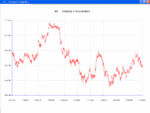consistency is winning month after winning month. not winning trade after winning trade.
That in a nutshell is what trading is all about, at least for those that trade for a living.
Certain
woulda-coulda-shoulda-artists living a
make-believe parallel life of pretense on boards to help them forget their real existence which consists to a large degree of asking customers if they want fries with their order will inevitably voice vociferous opposition to said simplicity, albeit with the small but pretty relevant blemish that they will never be able to back up their bragging.
;-)
But back to real life.
As I've said here many times, Mark Douglas is spot on in his analysis that anything can and will happen at any time in the markets (think, all it takes is one massive order that can be anything, a hedge, a position being covered, somebody entering the market with a view diametrically opposed to yours, but that will all have the same effect of throwing all of your clever analysis overboard and triggering your stop loss).
The very simple reason why markets cannot be predicted consistently is based on the fact that markets are made up of a conglomeration of huge numbers of participants all following totally different objectives...
You have hedgers, you have speculators.
You have fundamental traders, you have technical traders.
You have scalpers, daytraders, swing traders, position traders.
You have participants that see the same price levels, yet for some price is too high, for others it's too low.
Etc etc.
Every participant in markets has a different perceptive, different objectives, and different risk parameters.
That is why the notion of predictable markets that follow some inner system is nonsense.
The market is composed not of an inner logic or system that would be seperate from it's constituting participants, no, a market is nothing but the sum of it's constituting participants, each of whom has his own agenda, doing his own thing.
Thats why a quest for consistency is largely nothing than an irrelevant brain fart.
Not only is such a search for a holy grail a total waste of time, far worse, systems that are right more often than they are wrong are decidedly less
net profitable than their lower hit rate brethren:
Brett Steenbarger:
"...As a rule, maximizing batting average/minimizing drawdown comes at the cost of lowering overall system profitability...."
"William Eckhardt:
The Win/Loss Ratio
“One common adage on this subject that is completely wrongheaded is: You can’t go broke taking profits. That’s precisely how many traders do go broke. While amateurs go broke by taking large losses, professionals go broke by taking small profits. The problem in a nutshell is that human nature does not operate to maximize gain but rather to maximize the chance of a gain. The desire to maximize the number of winning trades (or minimize the number of losing trades) works against the trader. The success rate of trades is the least important performance statistic and may even be inversely related to performance. …
What really matters is the long-run distributions of outcomes from your trading techniques, systems, and procedures. But, psychologically, what seems of paramount importance is whether the positions that you have right now are going to work. Current positions seem to be crucial beyond any statistical justification. It’s quite tempting to bend your rules to make your current trades work, assuming that the favorability of your long-term statistics will take care of future profitability. Two of the cardinal sins of trading - giving losses too much rope and taking profits prematurely - are both attempts to make current positions more likely to succeed, to the severe detriment of long-term performance.”
Market Wizards
If you want a high hit rate system you can very easily achieve that through having stop losses that are larger than your take profits, that is all there is behind high hit rate strategies.
They do no more than provide psychological comfort at the cost of lowering your net profitability, and making it much harder and eventually impossible to keep compounding due to eventual liquidity issues.
The following is probably the
single most important insight on the way to wealth and fortune through trading:
Kenneth Grant, in
"Trading Risk: Enhanced Profitability through Risk Control", depicts his experience as risk manager for some of the best and most successful hedge funds, amongst others Paul Tudor Jones funds and
Steve Cohens SAC Capital, that:
ACROSS ALL MARKET CONDITIONS, TRADING STYLES, TIME FRAMES AND TRADERS, ONE RULE HOLDS TRUE:
10% OF ALL TRADES INEVITABLY ACCOUNT FOR 90% OF PROFITS !
Truly grasp that and you're on your way.
Have problems with that path that simply needs to be taken on the way towards your objective of net profitability and it's next to guaranteed that you'll end up as one of tradings 95% net losers, and you'll need to keep on asking customers what they want with their order.




